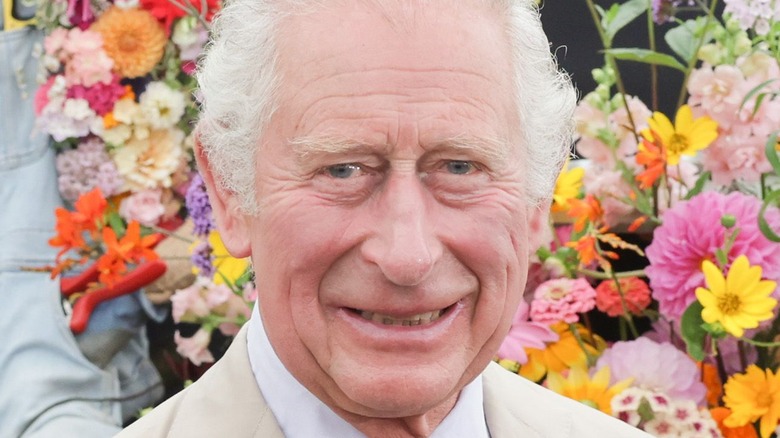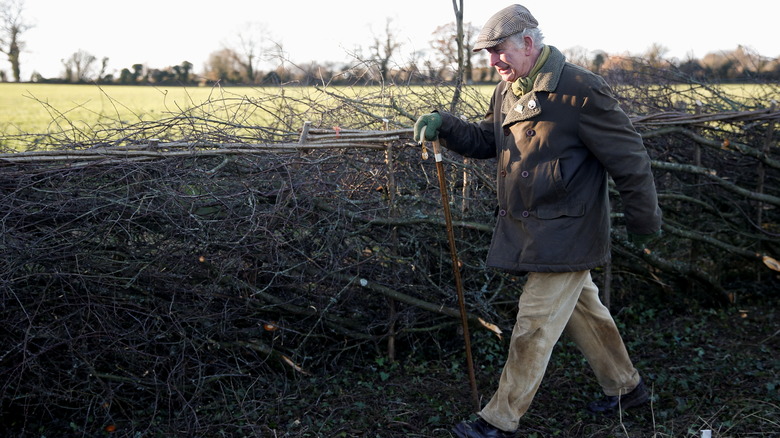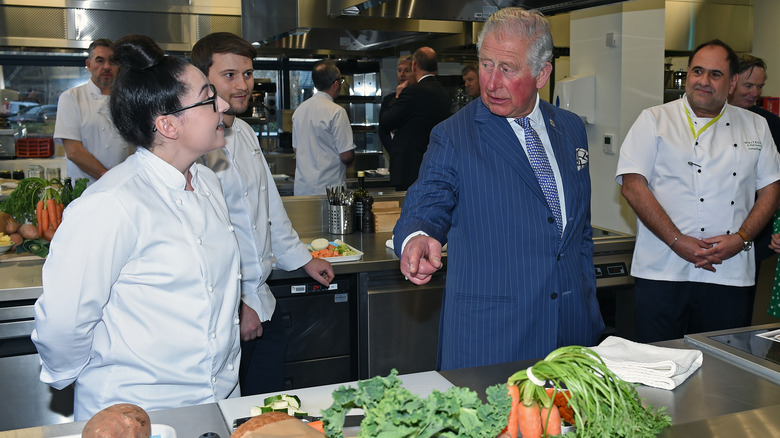Prince Charles' Influence Over The Royal Family Continues To Grow
As Queen Elizabeth scales back her royal duties, Prince Charles is entering the spotlight more and more. Back in May, the Prince of Wales made a monumental appearance when he stepped in for his mother at the official opening of Parliament, per NBC News. "Charles will accelerate his on-the-job training," said BBC royal correspondent Peter Hunt (via Express). "With the Queen progressively withdrawing from public life, the palace is keen to show the monarchy is safe in the hands of father and son."
Recently, Prince Charles arrived at the Commonwealth Games in a unique way — attending on his mother's behalf — showing up in an Aston Martin convertible. This more environmentally-friendly ride represents a cause that's been one of Prince Charles' passions since his youth. "I remember years ago, in the 60s, when I was a teenager, minding so much about all the things that were going on," Prince Charles recalled on The Royal Family's YouTube channel. "The uprooting of trees and hedgerows and draining of wet places."
Over the years, Prince Charles has spoken on behalf of the environment, urging world leaders to make a change, including at the G20 Summit and the U.N.'s COP 26 climate summit, per The Washington Post. Besides speaking out in a public forum, the prince has spent decades pursuing environmental concerns in private. According to recent reports, as the years have gone by, Charles' efforts increasingly influenced the home life of his royal relatives.
Prince Charles is putting his environmental stamp on Sandringham
In 2017 Prince Charles assumed control over the royal family's Sandringham Estate, per Vanity Fair. Located in Norfolk, England, this royal residence has been in the family since Queen Victoria purchased the property in 1862. While Sandringham's official owner is Queen Elizabeth, the monarch has permitted the Prince of Wales to transform the property. "Wherever you look now at Sandringham, it's very much about Charles's ethos," a source told Daily Mail.
For Charles, a prominent plan of that plan includes organic farming practices. By 2020, Sandringham was certified organic (via The Telegraph). The prince's plan was to transform the estate's farming in a similar fashion to what he previously achieved at the Home Farm on his Highgrove Estate. Sandringham's Farm includes an organic flock of 2,700 sheep and crops such as wheat, barley, and heritage grains. "A transition to organic management means introducing measures that will allow ecosystems to flourish as Nature intended and to ensure that we always put back more than we take from the land," Prince Charles told Country Life Magazine.
As reported by Daily Mail, Sandringham is now home to 500 rare-breed cattle. In deference to local wildlife, electric fences have been eliminated. To help lessen the estate's carbon footprint, farm buildings, such as cowsheds, have solar panels. Previously, the prince told the BBC that he had harnessed the sun's energy by installing solar panels at Highgrove's arm and at Clarence House.
Charles also shares the fruits of his labors with the public
Since 1992, Prince Charles has been selling products made from the bounty of his organic farming efforts. Charles' Duchy Organic foods now include over 300 different products, with profits benefiting organic farmers as well as the Prince of Wales's charities, per The Telegraph. Charles also sells products, such as Sandringham honey made by the local bees, in the estate's gift shop (via Daily Mail). In addition, apples and pears from Sandringham Estate's array of trees are made into beverages by the property's own juice company. "We're one of the largest organic outfits in the country and this is the type of farming people want," Keith Banham, Sandringham's farm manager, told Country Life Magazine. "The bit I take most enjoyment from is that we can convert to organic productively and efficiently, which then tells a good story to everyone."
Sandringham and Highgrove aren't the only localities that Charles has transformed over the years. In 2007, the prince purchased Dumfries House in Scotland. Open to the public, Dumfries includes organic vegetable gardens and is a popular field trip spot for schoolchildren. "A lot of them, like a lot of children everywhere, have no idea, and so we show them that a carrot doesn't come from a shop," said Melissa Simpson, head of gardens at Dumfries, per The Washington Post. "It grows in the ground. And then they make carrot soup."


